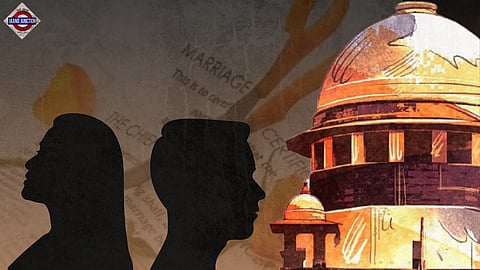

The Supreme Court on Monday said it can dissolve a marriage on the ground of "irretrievable breakdown". A five-judge Constitution bench headed by Justice SK Kaul said the Supreme Court can dissolve a marriage between consenting parties under Article 142 of the Constitution.
Further, the court ruled that the six-month period prescribed under the Hindu Marriage Act can be dispensed with subject to conditions.
Article 142 of the Constitution deals with the enforcement of decrees and orders of the apex court to do "complete justice" in any matter pending before it.
The court was hearing a batch of petitions relating to the exercise of its powers under Article 142 to dissolve marriages between consenting couples without referring them to family courts for protracted judicial proceedings.
"Article 142 must be considered in light of the fundamental rights. It should contravene a non-derogable function of the Constitution. Court under the power is empowered to complete justice," the Bench said.
The verdict came in a batch of petitions concerning the use of the top court's plenary powers to dissolve a marriage between consenting parties without referral to family courts to wait for the mandatory period prescribed under Section 13-B of the Hindu Marriage Act.
Article 142 empowers the apex court to pass decrees and orders which are necessary for "doing complete justice" in any cause or matter pending before it.
The issues involved were whether the Supreme Court could exercise its powers under Article 142 of the Constitution to dissolve a marriage, the broad parameters of such powers and whether the invocation of the said power was allowed in the absence of the mutual consent of the parties.
The case was referred to a five-judge Bench nearly five years ago on June 29, 2016 by a Division Bench of Justices Shiva Kirti Singh and R Banumathi (both retired) in a transfer petition.
After hearing arguments, the Constitution Bench had reserved its judgment on September 29, 2022.
